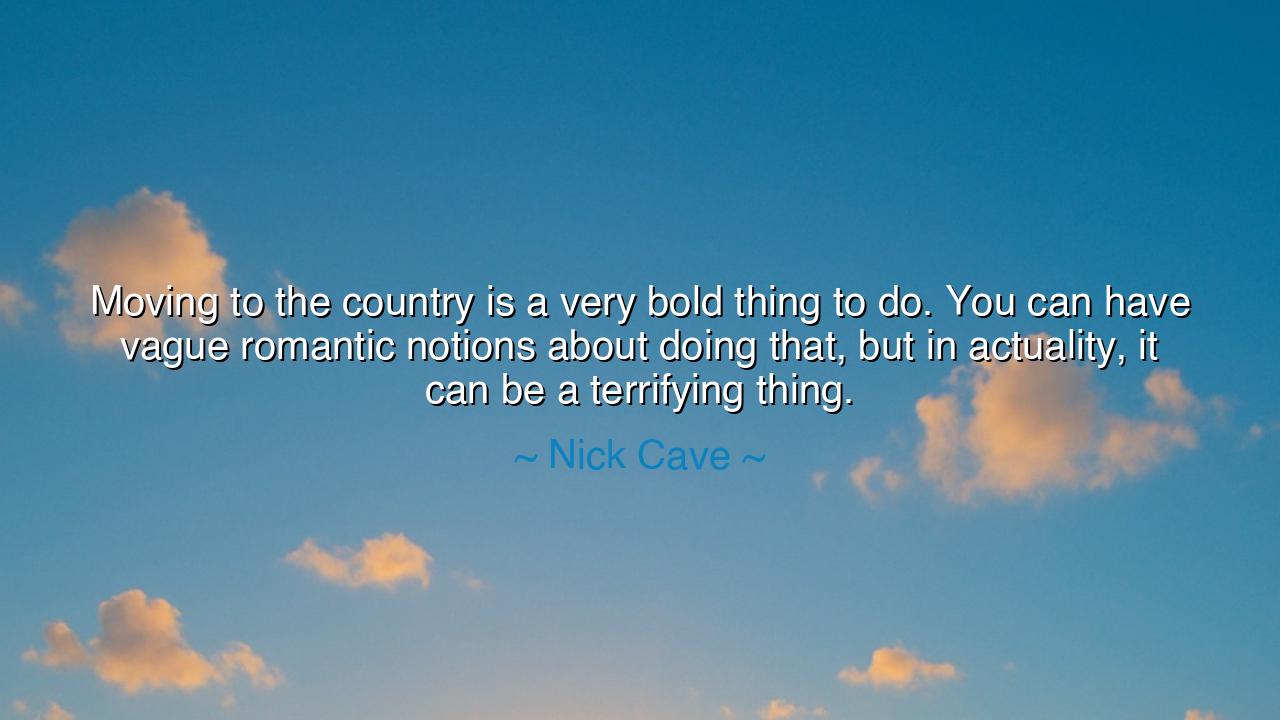
Moving to the country is a very bold thing to do. You can have
Moving to the country is a very bold thing to do. You can have vague romantic notions about doing that, but in actuality, it can be a terrifying thing.






The words of Nick Cave—“Moving to the country is a very bold thing to do. You can have vague romantic notions about doing that, but in actuality, it can be a terrifying thing.”—carry the voice of one who has gazed into the gulf between dream and reality. For he reminds us that while the imagination paints the country as a place of peace, beauty, and simplicity, the truth of uprooting one’s life, leaving the familiar, and confronting solitude is far more demanding than the gentle fantasies of the mind. In his words we hear both admiration for boldness and reverence for the hidden challenges that lie beneath.
To call such a move bold is to recognize the courage it demands. The cities hum with comfort, not merely in wealth or possessions, but in human closeness, in ease of access, in the nearness of society’s structures. To depart from these and seek a life in the country is to step away from the constant embrace of civilization and into a quieter, lonelier realm. It is not merely a change of home but a change of soul, for the silence of the fields and the shadows of the forests confront a person with themselves in ways the crowded streets never will.
Cave warns us of romantic notions—those airy visions that dress the country in endless golden fields, in peaceful sunrises, in a life free from turmoil. These images are not false, but they are incomplete. For alongside the beauty of the country lies isolation, the vastness of distance, the loss of immediate community, and the confrontation with labor unsoftened by convenience. It is the reminder that romance without reality is illusion, and illusions, though sweet, can betray the unprepared.
This truth has echoed through the lives of many. Recall the American pioneers who crossed rivers and mountains to settle new lands. To the dreamers in the East, the frontier promised freedom and space, a new Eden. Yet those who went found hardship—loneliness, hunger, and danger. The dream of romance became the test of endurance. And yet, those who persevered carved lives of meaning, proving Cave’s words: what is terrifying can also be transformative.
The meaning of this reflection is therefore not to discourage, but to reveal the fullness of truth. To move to the country is not simply to escape the noise of the city—it is to confront silence, distance, and the raw weight of existence. The terror Cave names is not an enemy to avoid but a trial to endure, for in enduring it, one grows. Just as heroes of old entered forests and caves to meet their destinies, so too does the modern soul who leaves the city enter a new wilderness to meet themselves.
The lesson is clear: beware of living only by romantic notions. To dream is holy, but to dream without preparing for the hardness of reality is folly. If you desire peace, be ready also for solitude. If you long for beauty, prepare to labor for it. If you seek freedom, know it comes with responsibility. Thus, the wise dreamer tempers vision with courage, so that what begins as fantasy becomes a life truly lived.
Practically, this means approaching every great change in life with both reverence and realism. Do not abandon your dreams, but arm yourself for their cost. Seek advice from those who have walked the path before. Embrace the terror as part of the boldness, and let it refine you rather than defeat you. For as Nick Cave teaches, the country is both romantic and terrifying—and so too is every true journey worth undertaking.
Thus, his words become not only about fields and valleys, but about life itself. Every bold choice carries romance, and every romance carries terror. To walk the path is to accept both. And in that acceptance lies transformation, the turning of dream into reality, and of fear into strength.






AAdministratorAdministrator
Welcome, honored guests. Please leave a comment, we will respond soon